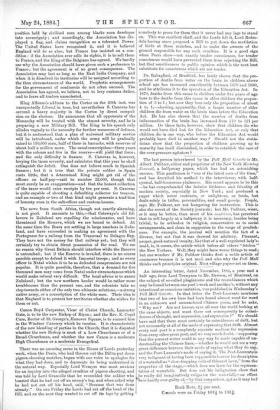An interesting letter, dated November, 1882, a year and a
half ago, from Lord Tennyson to Mr. Dawson, of Montreal, on the subject of so-called plagiarisms and the resemblances which may be found between one poet's work and another's, without any intentional or conscious imitation, was published in Wednesday's Pall Mall Gazette. In that letter the Poet-Laureate mentions that two of his own lines had been found almost word for word in an unknown and untranslated Chinese poem, and he asks, " Why not ? Are not human eyes all over the world looking at the same objects, and mast there not consequently be coinci- dences of thought, and impression, and expression ?" We should have eaid that there must certainly be coincidences of drift, but not necessarily at all of the mode of expressing that drift. Almost every real poet is a completely separate medium for expression from every other great poet, and we very much doubt,—supposing that the present writer could in any way be made capable of un- derstanding the Chinese lines,—whether he would not see a very great difference between their mode of saying what they do say, and the Poet-Laureate's mode of saying it. The Poet-Laureate is very indignant at having been supposed to borrow his description of a waterfall as " slow-dropping veils of thinnest lawn," from the properties of the stage,—which does use lawn for the represen- tation of waterfalls. But does not his indignation show that he really did imaginatively vulgarise the waterfall,—an effect e is hardly ever guilty of,—by that comparison, apt as it may be?
































 Previous page
Previous page